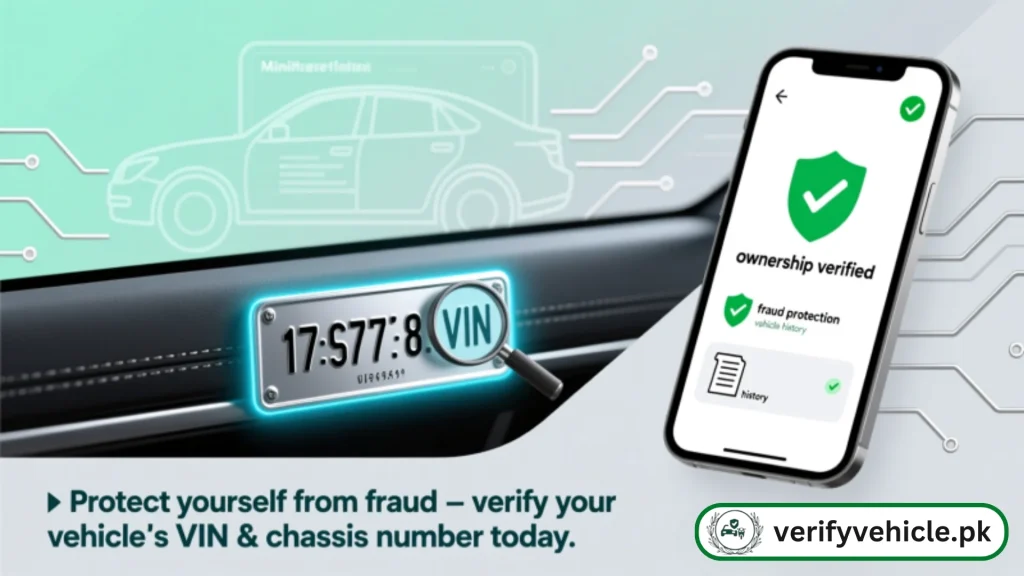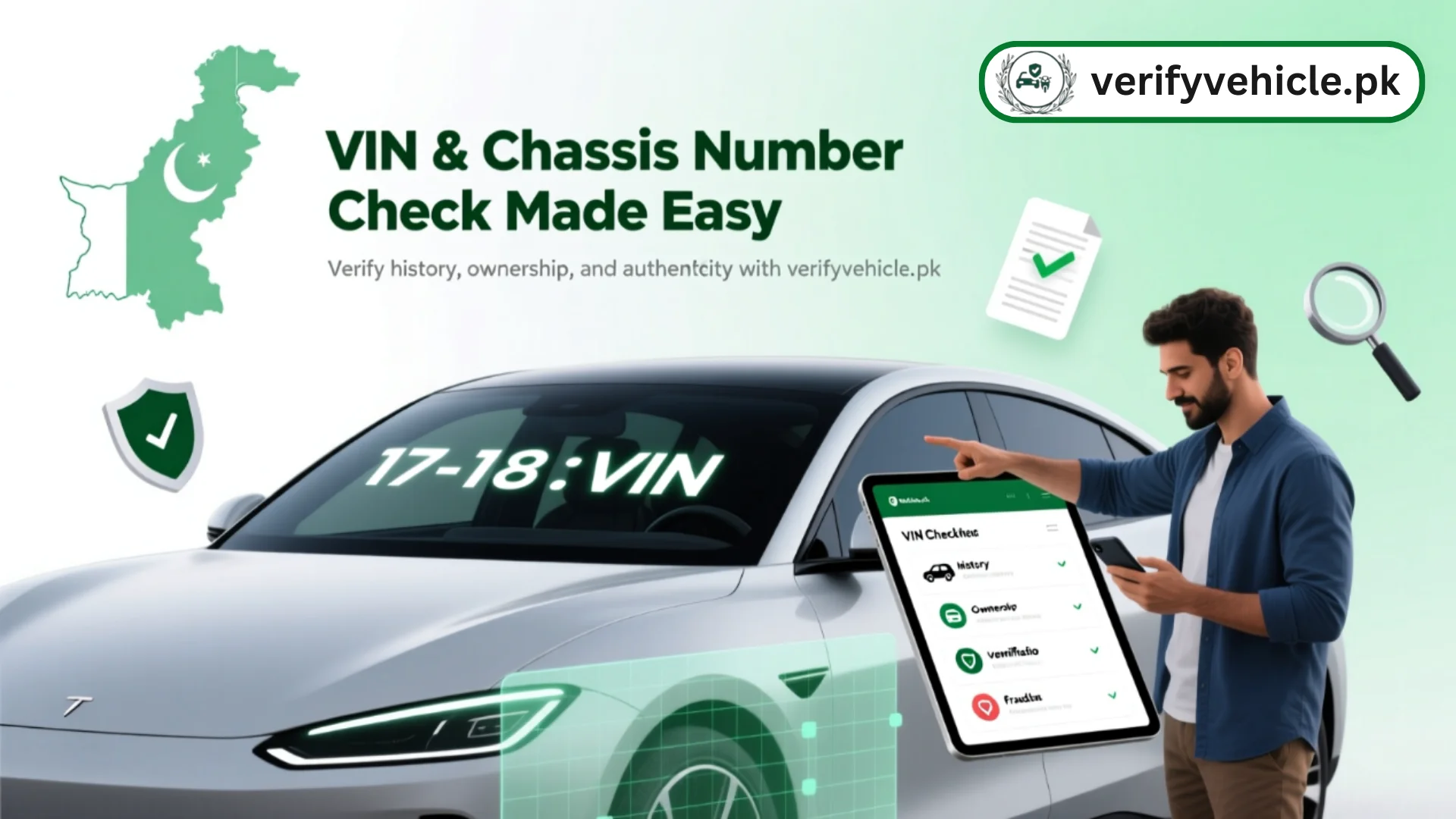VIN Chassis Number Check Online – Verify Vehicle Info
A VIN chassis number is an exclusive sequence of digits and capital letters consisting of 17 characters, like the unique fingerprint of a vehicle. Officially known as the vehicle identification number check (VIN), it contains the necessary information to define a vehicle’s make, model, and features. The term “chassis number” typically refers to the stamped serial number on the vehicle’s frame however, it is often used interchangeably with VIN, as both uniquely identify a vehicle. The history and ownership of the vehicle can be traced using this identifier.
Doing a vin chassis number check is a big step to fraud prevention, vehicle history check, and legal ownership. It protects buyers from buying stolen, salvaged, or even cloned vehicles that come with hidden damages or monetary liabilities. Sellers can prove that their vehicle is legit and thus earn the trust of prospective buyers. Insurance companies and law enforcement, in turn, check VINs to verify ownership and investigate crimes, so vehicle identification number check is a crucial checkpoint in the car trade.
چیسس نمبر ایک منفرد 17 حروفی کوڈ ہوتا ہے جو اعداد اور بڑے حروف پر مشتمل ہوتا ہے اور گاڑی کی شناخت کے لیے فنگر پرنٹ کی طرح کام کرتا ہے۔ اس میں گاڑی کے ماڈل، کمپنی اور خصوصیات کی تفصیلات شامل ہوتی ہیں۔ اگرچہ چیسس نمبر گاڑی کے ڈھانچے پر کندہ شدہ سیریل نمبر کو کہا جاتا ہے، لیکن دونوں اصطلاحات کو اکثر ایک دوسرے کے متبادل کے طور پر استعمال کیا جاتا ہے تاکہ گاڑی کو منفرد طور پر پہچانا جا سکے۔ چیسس نمبر کے ذریعے گاڑی کی ملکیت اور اس کی سابقہ ہسٹری بھی معلوم کی جا سکتی ہے۔
Where To Find The VIN Or Chassis Number Check On A Vehicle
It is really important to know where the code is located for accurate checking. The chassis number check is usually in various places on a vehicle; among these are:
- The bottom corner of the windshield on the driver’s side is visible from outside through the glass.
- Within the driver-side door frame or door jamb.
- Stamped on the engine block or in the front of the chassis near the firewall underneath the hood.
- Beneath the spare tire well in the trunk.
- Printed on vehicle registration documents and insurance papers.
- Finding these numbers and ensuring that they match those on other documentation is key to performing a proper vehicle identification chassis number check.
How To Check VIN Numbers Online
These days, checks can be done online across several sites freely or for a fee. Follow the steps below for a check:
- Physically locate the vehicle’s VIN chassis or search for it in associated documents.
- With trusted identification sites, one can check for VINs, NHTSA, EpicVIN, or even local government portals.
- Carefully insert the complete 17-character vehicle identification chassis number check in the search box.
- Fetch the detailed report that displays the ownership records, accident history, mileage, recalls, and lien information.
- These checks are essential in providing buyers, sellers, and owners with quick and detailed reports.
Understanding What Information a Vehicle Identification Number Check Provides
The vehicle identification number check provides very crucial details about the vehicle verification, like the identity of the manufacturer and its country of origin. Make, model year, and assembly plant. Specifications of the engine and body type. Accidents and a history of damages recorded. Safety recalls are still open. Title status, including salvage or lien. An actual record of mileage can help in detecting odometer fraud. This huge stream of information enhances transparency, allowing users to make informed decisions about buying or selling.
Free VIN and Chassis Number Checking Services
Several online services offer free, simple chassis services. These include some common, recognized sources:
- National Highway Traffic Safety Administration (NHTSA) decoder.
- National Insurance Crime Bureau’s (NICB) VINCheck for stolen vehicle databases.
- Free basic information offered by AutoDNA and Vindecoderz.
- Government portals from countries like Pakistan that provide accessible vehicle verification services.
- While free checks are useful for some preliminary reports, paid services often provide the full history and fraud detection.

How to Carry Out Chassis Number Verification
Authentication comprises significant steps, which include physically comparing the number that is stamped on the vehicle frame with the corresponding documents and registration certificate of the vehicle. Cross-check using trusted government or online platforms. Look closely for tampering signs, such as scrapes, misaligned digits, or varying fonts. Double-check that this matches the manufacturer data and registration recall. Authenticity verification reduces the chances for an unsuspecting buyer to be duped into purchasing cloned or tampered vehicles, leading to legal issues at times.
How to Decode a VIN Number
Decoding a VIN reveals the encoded information of the vehicle:
- The first three characters, called World Manufacturer Identifier (WMI), indicate the country and maker.
- Characters four to eight indicate the Vehicle Descriptor Section (model, body style, engine type).
- Character nine is the check digit for validation.
- Character ten is the model year.
- Character eleven represents the plant of manufacture.
- Characters twelve to seventeen represent the unique vehicle serial number.
- Mastering VIN decoding is the key to unlocking hidden knowledge about this.
Importance of it in Used Vehicle Transactions
In the sale of second-hand vehicles, one of the best tools. It helps ascertain that the car in question corresponds to the identity on the documents. That no stolen or cloned vehicles are bought. Past damages or accidents are fully disclosed. The odometer readings are accurate and have not been tampered with. No liens or recalls have been placed against the title. By building this sort of confidence in the used markets for both buyers and sellers, it also protects the interests of honest businesspeople.
How to Use Government and Third-Party Websites
Governmental and third-party websites provide options for a more comprehensive vehicle chassis code. Government portals provide official, authoritative records on registration, ownership, and compliance. Third-party platforms aggregate global databases for in-depth analysis of history, accidents, and theft. Cross-verifying across multiple sources adds to the accuracy and reliability. Hence, using these resources would guarantee a good authentication.
Common Myths about VIN and Chassis Number Check
Several myths surround the VIN chassis number check:
- Myth: Only dealers can perform it.
- Truth: Anyone can check online for free or paid services.
- Myth: VIN check always costs money.
- Truth: Many free, reliable checks exist.
- Myth: VIN fixes vehicle price.
- Truth: VIN provides history, not pricing.
- Myth: The chassis number check always differs from this.
- Truth: Usually, they refer to the same identifier.
Facts have shown that awareness will encourage the greater adoption of it checks for safe vehicle transactions.
Conclusion
By all means, it is necessary to undertake a thorough check of the chassis number of a vehicle if one is buying, selling, or verifying any vehicle whatsoever. A VIN check on a vehicle gives critical information about its past, details about its manufacture, and ownership that can protect both buyer and seller from fraud and legal entanglements. Any transaction involving a car is completely safe when it comes to transparency and authenticity, when the owner knows how to find this and how to access the data present in it, and where to go for reliable online checkups. Digital verification is currently making the process of searching easier and more accurate worldwide, which adds to trust in automotive markets. Whether the person uses free government portals or an extensive paid service, they regularly check on it and make safe and well-informed purchases.







